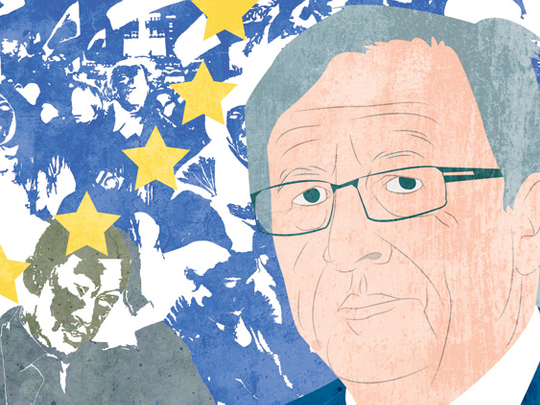
There are no winners in the quarrel about the next head of the European Commission. British Prime Minister David Cameron is courting humiliation; German Chancellor Angela Merkel is backing the wrong candidate for the wrong reasons; and the commission will get a president unequal to the task.
As for the citizens who railed against the political elites in elections for the European parliament, well, the shabby deal now taking shape promises vindication. Sometimes you really have to struggle to make the pro-European case.
Those searching for a theological message in the expected choice of Jean-Claude Juncker as president of the commission will be disappointed. Sure, the former Luxembourg prime minister is an old-fashioned federalist, but that is nothing to get excited about.
The days when Jacques Delors could turn the commission into an engine of integration have long gone. No, forget visions of Europe’s future. The argument has all been about competing national politics. And, put bluntly, the dynamics of the European Union (EU) dictate that Merkel’s politics trump Cameron’s.
If there has been a surprise, it is the ruthlessness with which the German chancellor has subordinated her oft-declared Europeanism to some pretty tawdry horse-trading designed to get herself out of a domestic fix.
Whatever questions the EU asks itself after last month’s elections (and they should all be about growth, jobs, and competitiveness), the choice of Juncker is not an answer. I say this without personal animus. He knows the Brussels machinery. By all accounts, he is an accomplished dealmaker.
Yet, Juncker is the wrong choice because the facts of Europe, and of the world, have changed. If the EU is to regain its balance, it has to turn the Eurozone into a monetary union that is at once politically sustainable and structurally robust.
It also needs someone who can mediate the debate about British membership if Cameron wins the 2015 general election. Juncker is anything but a moderniser; and he is not at all trusted by the British.
After some aggressive lobbying by Berlin, Juncker now has the tacit backing of most EU leaders. Yet, it is an open secret that few see him as an ideal candidate. In a secret ballot of the European Council, he would struggle to secure a handful of votes. Were Merkel assured of the seal of the confessional, she too would probably cast her vote elsewhere.
Juncker is the frontrunner because of a power grab by the parliament. The treaties say the president is chosen by governments with the consent of MEPs. The latter are turning this on its head. They insist governments appoint the candidate of the largest party in Strasbourg. Juncker is the so-called Spitzenkandidat of the centre-right European People’s party. Claims that this is about bestowing democratic legitimacy on the process are, to put it mildly, hogwash. The commission is to become a creature of the parliament.
Merkel had thought the Spitzenkandidat could be quietly sidelined. Not so long ago, she had sent out reassuring signals to that effect. However, domestic politics intruded. She underestimated support for Juncker within her own Christian Democrat Union and was caught off guard by the media reaction when she mused about alternatives. She also has to square her Social Democrat coalition partner.
The result is an, albeit still tentative, three-way backroom deal that gives Juncker the commission job, assures the SPD’s Martin Schulz of another term leading the European parliament and leaves with Merkel the appointment of Germany’s vice-president at the commission. You could call this tawdry; or you could say it reflects the brute reality of German power. Both, it seems to me, are true.
As for Germany’s EU partners, they have not been given a choice. The political priority of France, Spain, Italy and others in the Eurozone is to secure Berlin’s consent to a watering down of the single currency’s fiscal rules. This is not the time, they have been reminded by the chancellor’s aides, to defy her on the question of who runs the commission.
Old hands in Brussels say it was ever thus. The top jobs have always been filled through political trade-offs. This time, though, at least one European diplomat has been reminded of the depths plumbed by politicians in France’s ill-fated fourth republic. I am probably naive, but I imagined Merkel had a slightly loftier view of the worth of European institutions.
All this leaves Cameron isolated at this week’s EU summit. Most will have little sympathy with the prime minister. His European policy has been shaped by efforts to manage his own party rather than the pursuit of Britain’s national interests. By stepping back from the EU, he has wilfully surrendered his own leverage. The promise of a referendum on Britain’s membership was a shallow tactical manoeuvre that could yet turn into a strategic catastrophe. For all the EU’s flaws, Britain is better off in than out.
That said, on Juncker, the British prime minister is right. Not because the prospective president will turn the EU into a United States of Europe, but because his candidacy speaks of the head-in-the-sand view of the world that has landed the continent in so much trouble. Overruling Cameron on this will arm eurosceptics and, just possibly, tip the balance further towards Britain’s exit. Either way, it will be bad for Europe. Merkel still has time to change her mind.
Financial Times









